Taiwan in Turmoil
Cebrena holds my arm as I scurry to keep up with her, Leah, and their three friends amidst a huge crowd. I am following Leah’s bright red jacket. We channel a path through the crowds of plastic-coated bodies swinging flags of the Republic of China in their fists – Taiwan’s flag, not to be mistaken for the People’s Republic of China. It is a misty Thursday in Taipei, and hundreds are gathered at the Palace to protest the presidential election of 2004. We mingle into the crowd; I catch a faint smell of incense lingering overhead a moment, as if ensconced in the general Taipei air.
This is only my fifth week in Taiwan, and it feels like a bomb has been dropped. That may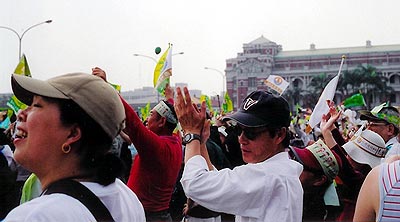 be insensitive to say, since the international news headlines are filled with stories on the presidential debate in Taiwan, concurrently with reports on the Middle East, where bombs have been killing for years. I am blessed as a fortunate traveler caught up in a political hotbed of warring visions, rather than actual armies.
be insensitive to say, since the international news headlines are filled with stories on the presidential debate in Taiwan, concurrently with reports on the Middle East, where bombs have been killing for years. I am blessed as a fortunate traveler caught up in a political hotbed of warring visions, rather than actual armies.
The first sight to greet us as we exited the polished subway was a stash of new rain ponchos of thin plastic. A woman wildly gestured toward them for all those departing the subway. The next thing I heard was a middle-aged man’s enthusiastic prompt of, “Go for it!” in Mandarin. My friends all cheered back in unison, then burst out giggling. They had never been to a political rally.
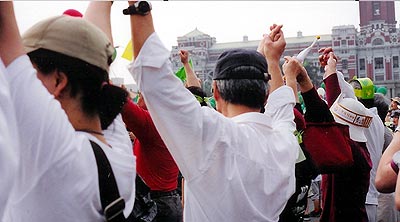
The Taipei Presidential Palace had been holding protests for most of the week since the elections held last Saturday declared Chen Shui-bian a second-term president with a winning margin of 0.2 percent of the votes. The people that were gathered were bereaved and angry, unable to accept it. On a large bandstand, a misty black-and-white propaganda poster hails a vague, duel slogan: “We want truth. We want justice.” The stage’s frame is rather gaudy and appears to have served many purposes in the past – from pop concerts to Barney and Friends – as its borders are frilled with carnival-esque lights in shapes of boats. Across the wide stagefront, another stand overlooks the vast audience. It is from this stage that a speaker emanates strong words of encouragement and defiance; an enormous cluster of televisions covered by a thin layer of plastic provide a close-up of the speakers on this stage. Their voices are showered over the crowd through amplifiers planted in the back of the arena. We felt as if we had walked into a hard rock concert.
Yet walking into center view of the stage where the speakers stood, the tall dark façade of Taipei 101 glowed in the background with characters drawn from blue-lit windows. The slightly tapered shape of the world’s tallest skyscraper loomed beyond the speakers’ stage, creating a peak not unlike the simplistic Chinese character for mountain, in artful, moving symmetry.
Suddenly, a song breaks from the speakers, and a jingly Hakka tune is being led by the people on the stage. I begin waving my red-and-blue starred flag along with the crowd. Not everybody was familiar with the lyrics, but all join in the temporary merriment of it with their flags. I use my flag along with everyone else to route on speakers who get up to the stand afterward. Something is shouted then “Right or wrong?” followed. We all shout, “Dui! (right).” My Mandarin skills are weak. I grab hold of a few words and pieces of syntax, but the speed (not to mention passion) with which they are spoken makes their speeches ultimately inscrutable to my ears. One woman approaches the stand. She speaks in a squealing, high-pitched purr through the multitude of amplifiers, sobbing in between drawn-out words for drama. I wonder how effective she is; people are quieter in respect. I sense she is going on for a little too long after a while. At one point, I notice a few in the crowd flinch at a certain screamed line. One of our friends tells me that she said, “She feels like she wants to commit suicide.” I wonder what to do – clap?
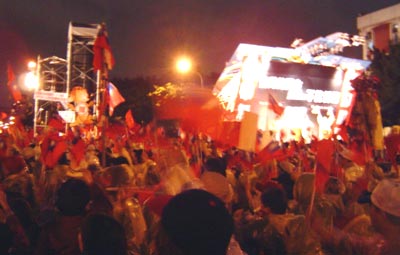
Looking among the crowd of locals, nobody stares at my half-white face. They are too caught up in the emotional fervor being expressed from the stage – and for a grateful change of pace when it comes to crowded places, I don’t feel as much of the foreigner that I am. Our group is unique amongst the crowd because we are young. Many of our fellow students’ parents wouldn’t allow them to enter this scene. We aren’t teenagers, but even college students seem like a rarity in this bustling crowd dominated with people above thirty. A man with a long white beard stands upon a pillar holding a handful of flags in one hand (for lack of one bigger one of which there are a few scattered atop the heads of the crowd), and spreads his arms like an eagle. He turns occasionally to engage the audience who are behind him, maintaining a monkish silence.
In the carefully plotted aisles, people come by pushing carts of food, or handing out packages of buns or bottled water. There is no shortage of goods – they urge them upon us, and passed out glow-sticks after them. Upon small stools, the young and old sit and watch patiently from their seats. Some look as old as seventy. One stool has packages of giveaway food hoarded in a pile underneath. Many look as if they had stayed in their seat all day long into the evening, with expressions of chagrin drawn upon their faces. My friends are bursting with energy, rapping their flags to the chorus of cheers. They teach me a few of the most common chants – “Step down, Chen Shui-bian,” “Long Live the Republic of China.” They are through with asking me why I came. Of course I wanted to see the protest; my own mother emigrated from Taiwan and supports the KMT or Kuomintang (the Nationalist Party). They smile and tug me into their tight circle closer, like I’ve gained initiation. To them, I suppose, I’ve lived up to my criteria for being here as an exchange student who doesn’t flaunt my Americanism, who is not hesitant to brave alienation when it comes to chatter that I cannot understand. I help them speak English, they help with my Mandarin. I never stop encouraging them to take me anywhere in Taiwan, try the most disarming foods to Americans, perform Buddhist rituals in temples, or let myself be dragged through the teeming crowds at a political rally in a country across the globe from my native one.
We head down a long aisle at the sideline. A row of tables serve an assortment of free food, from full, hot lunch boxes, to a pile of candy. How in the world did they pay for all this? At one table, people are gathered around to make donations to the KMT, including Leah and one of her friends.
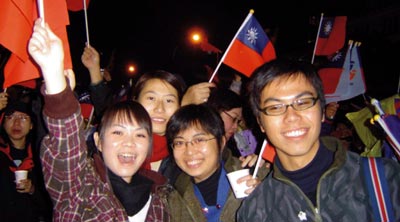
I take a steamed bun. It is spongy and white, filled with warm pork filling. A sweet bun later, and I am utterly filled. Cebrena takes a cup of a steaming hot ginger drink that is good for one’s health from a table. Its pungency seems to clear my nasal passage from a distance. At one table there are people handing out flyers instead of food. The document is written in plain type on white paper, as if someone had run them off from an unevenly-spaced memo on their computer. One paragraph is provided in Chinese, the bottom ones, in English. The opening begins, translated: “From me, a medical doctor of 10 years experience…” It goes on to allege that the type of bullet that struck Chen the day before the election causes severe bruising, which was unapparent in the photos of his wounded belly.
There are many propaganda signs that I haven’t been able to make out for their Chinese characters. One sign, though, catches my eye; it is written in English: “Don’t turn your back, United States. Taiwan deserves a fair election.” Others I can read are more blatantly hateful: “Dirty Chen cheated on Elections.” I wonder when this surging hatred will stop.
I had gone to a rally for the DPP (Democratic Progressive Party) a few weeks before on the anniversary of the 2/28 massacre. I deemed the crowd to be mostly young to middle-aged adults. Young people aren’t as into the “new” party as one might think. The controversial, independence-seeking party frocked in bright green hats and banners is old hat. The kids my age have grown up watching Chen’s rise to power; many do not like him, or distrust him. Then again, I am situated in Taipei, the KMT’s stronghold, while the DPP is traditionally headquartered in southern Taiwan.
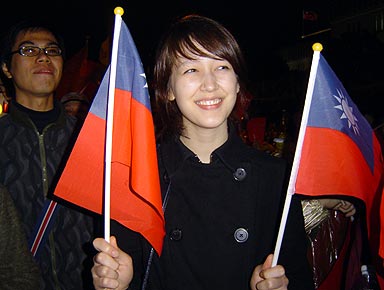
My friends and I shuffle along the aisle of tables and stands, glancing upon various pins and keepsakes with blinking lights on them. I buy a flashing one with the Taiwanese flag on it – red and blue, with a white star in the corner, so similar to my own country’s. We lose half our party. While searching and eking our way along the crowd, we are caught in the stream of a clan carrying a long banner. Those carrying the poles are about ten feet apart from each other, and we duck from side to side of the walking train. A bowl drum passes by, and another drummer passes with a small, more traditional steel gong. We find our friends again and unite amidst the passing clan.
We clasp one another’s arms and jacket hoods alongside the large banner and it passes us smoothly into the street. The protest is long from over; new tents with inhabitants presumably staying the night are camped behind the massive rows of people before the stage. I leave the arena after this glimpse into the heart of Taiwan in perhaps the most heat since the Republic of China took reign fifty years ago. The sounds and sights of the old Taiwan astound me still; while a new Taiwan begins its crying stages.
